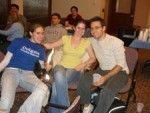College Dems, Reps Party Hard

In the days leading up to Tuesday’s nationwide midterm elections, the Colgate campus was as politically active as it gets.
As their national counterpart made its final push towards gaining a majority in the U.S. Congress, Colgate’s College Democrats were particularly active, as they hosted events large and small in a last-ditch effort to push their agenda. The College Republicans and Democracy Matters were quieter, but joined with the Democrats to put on an Election Night party in the O’Connor Campus Center (COOP).
The College Democrats marked the run-up to the election by sponsoring a brown bag lunch with Professor of Political Science Michael Hayes on Thursday and hosting a phoning event for CallForChange.org on Sunday night.
“As a group, we think politics are an important part of Americans’ lives,” College Democrats co-President Heidi Johnson said. “Education and participation are both important aspects of citizenship. That’s why we put on the brownbag and held the Call for Change event.”
Hayes’ lecture and subsequent discussion took place on Thursday in the Women’s Studies Center. Hayes expounded on the importance of Tuesday’s election, which he called “the election of the angry moderate,” referring to the widespread displeasure with Washington’s Republican leadership on the part of those that fall in the middle of America’s highly polarized political spectrum: the voters likely to determine elections.
The professor himself was visibly upset as he spoke about the “really, really bad” policies of the Bush administration, including the War in Iraq, Bush’s statements that allow him to ignore certain provisions in laws passed by Congress and the White House’s sanctioning of torture to fight the War on Terror.
The Democrats are divided about what to do in Iraq, he explained.
“All the options suck,”this Kansas-born former Republican said.
“This lecture wasn’t a biased one,” Johnson’s co-President Allie Weinreb said. “The information came from a very knowledgeable professor who has been active in both parties.”
Johnson was just as pleased.
“I felt I learned a lot, as did everyone else there,” Johnson said. “I think he brought forth the importance of this election, something that may not have been fully understood by many people before.”
Johnson may have been referring to Hayes’ explanation of what it means for a party to hold a majority in the House of Representatives. The majority party chairs all committees, allowing it to set the House’s general agenda and investigate transgressions on the part of the opposing party if it so chooses.
Hayes concluded his talk by urging everyone present to get beyond their frustrations and get involved in American politics. He quoted a passage from C.S. Lewis’ essay, “Why I am not a Pacifist,” stating a need to tackle big problems one tiny aspect at a time.
Hayes’ call to action was the impetus for the Democrats’ next event, a Call for Change party on Sunday night in the Sapperstein Jewish Center. At the party, ten Democrats logged on to CallForChange.org, a website devoted to contacting liberals nationwide and urging them to vote in the election. The group made about 150 calls to citizens in districts whose elections had important implications for the makeup of Congress, from Pennsylvania to Virginia to Indiana.
The College Democrats were also in touch with State Senate candidate Dave Valesky’s campaign about helping canvassing-going door-to-door in the name of democracy – but Valesky’s people fell out of touch and the effort fell through.
The College Republicans joined the Democrats in an effort to set up a debate between Republican John McCugh, the local House of Representatives incumbent, and his challenger, Democrat Bob Johnson, on the Colgate campus, but that idea also failed when McCugh declined the invitation.
The College Republicans were not able to get involved with its party beyond campus, though a congressman in a nearby district asked for its assistance.
With the help of Democracy Matters, the two on-campus party organizations did succeed in organizing an Election Night bash set up to watch the results come in on CNN in the Coop TV room. Each group pitched in to provide food. For the Democrats, that meant baking blue cupcakes to show support for their party, whose victories are indicated by “blue states” on the maps of the country shown on TV.
“Our cupcakes definitely contributed to the Democrats taking the House,” Johnson joked.
College Republicans President Travis O’Brien was impressed with the turnout, though he admitted it was a mostly Democratic crowd.
“I thought it was a pretty good showing,” he said. “In general, there was more involvement this week than I expected. I always thought this was a politically apathetic campus. It’s not like people were out marching, but there was a good amount of interest in what went on, especially for a midterm election.”
In the election itself, the Democrats gained 29 seats in the House of Representatives and five seats in the Senate. The wins give them a majority in the House and a potential majority in the Senate, pending the results of the Virginia Senate race, which requires a recount and the counting of absentee ballots to determine the winner. Following the election, on Wednesday, Secretary of Defense Donald Rumsfeld resigned after six years as the head of the Pentagon.



